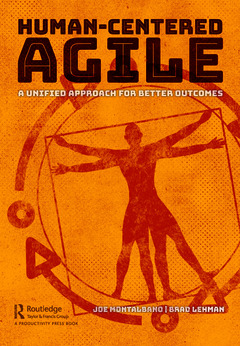Human-Centered Agile A Unified Approach for Better Outcomes
Auteurs : Montalbano Joe, Lehman Brad

This book is a guide on how to apply Human-Centered Design (HCD) practices to an Agile product development model that is used widely throughout industry and government, where it is applied primarily to software and technology development efforts. This has been an ongoing industry challenge due to the fact that HCD prioritizes time spent understanding the problems to be solved (time spent in the problem space), while Agile prioritizes a fast hypothesize-and-deliver model (time spent in the solution space).
Organizations that attempt an Agile transformation abandon it either because it was too difficult or because it did not deliver the hoped-for results. At the same time, efforts to improve the design and experience of their products using Human-Centered Design have a tendency to fall short because it can be difficult to see the ROI of design efforts, even while companies like McKinsey document design-driven successes. What?s more, a company that successfully adopts Agile often seems to have an even harder time implementing HCD and vice versa. This is particularly disappointing since Agile and HCD should be mutually supportive.
In practice, Agile teams often bypass HCD efforts in favor of finishing their goals and thinking they are doing well, only to have their work product fail to meet the actual end user?s needs. At first the team will become indignant. ?We followed the expert guidance of our Product Owner, the ?Voice of the Customer,?? they will say, followed by ?but? it met all of the Acceptance Criteria, they should love it.? It?s a failure of Agile that this type of sub-optimal delivery happens so regularly and predictably. The fact that team responses can be so accurately predicted in advance (by those who?ve seen this movie many times before) point to a process failure or inefficiency that is widespread and desperately needs to be addressed.
Alternatively, teams will invest too heavily in up-front discovery efforts that slow down delivery to an unacceptable point, often while also failing to capture research-based findings in a way that matures the overall strategic product or portfolio understanding.
The cost of misfiring goes far beyond a bad delivery or an angry customer. Decreased team morale drives poorer future performance (cost), turnover if left unchecked (more cost), and non-productive blame sessions that lead to degraded faith in the Agile product development model itself.
This book identifies solutions based on successful methods of integrating HCD practices by phase into an ongoing agile delivery model, from the discovery through implementation and evaluation, including:
- key success factors for an HCD/Agile engagement approach,
- critical points of delivery, and
- strategies for integrating HCD into teams based on the existing design maturity of an organization or product team.
Chapter 1 -- What Is Human-Centered Agile and Why Is It Needed? Chapter 2 -- A Primer on Human-Centered Design Chapter 3 -- HCD Activities and Artifacts from Discovery Through Concept Validation Chapter 4 --HCD Activities and Artifacts from Refinement Through Evaluation Chapter 5 -- Bringing Human-Centered Design into Agile Chapter 6 -- "What Are the Stakes?" Chapter 7 -- Planning and Conducting HCD Activities in Agile Chapter 8 — Managing Distributed Design Efforts in Agile Chapter 9 — Managing Distributed Research Efforts in Agile Chapter 10 — Expanding to Small Groups of Agile Teams Chapter 11 — An Introduction to SAFe® Chapter 12 — Updating Requirements and Processes at Scale Chapter 13 — Scaling the Team Structure Chapter 14 — Delivery at Scale: The SAFe® Continuous Delivery Pipeline Part VI — Measuring and Applying Human-Centered Agile Chapter 15 — Measuring Solution Performance Chapter 16 — Human-Centered Agile Applied Conclusion
Joe Montalbano, MBA, SPC, PMP, PMI-ACP, has over 20 years of software development, management, and consulting experience. He has full-SDLC experience in global enterprise, government, startup, and consulting environments where he has succeeded in roles such as Lead Developer, Senior Software Architect, Project and Program Manager, Director of Software Development, Management Consultant, Scrum Master, and Agile Coach.
Joe is an Agile Coach and Scaled Agile Program Manager at Noblis, an elite technical and advisory firm dedicated to developing forward-thinking solutions for the public interest. He currently leads a top-shelf group of Agile Coaches, Scrum Masters, and Program Managers supporting Scaled Agile implementations at multiple Federal government agencies. He leads large, complex, transformative Agile programs with hundreds of technical participants and multiple vendors and coaches SES- and GS15-level executives.
Prior to joining Noblis, he spent 11 years developing and maintaining large financial and insurance applications at Zurich North America, first as a Senior Software Architect and then as a Senior Application Development Manager. He has successfully led Agile transformations and managed dozens of software development efforts using multiple onshore, offshore, distributed, and virtual development teams. Joe also has hands-on skills throughout the Microsoft technology stack.
Joe is certified by Scaled Agile, Inc. as a SAFe Program Consultant (SPC) and by PMI as a Project Management Professional (PMP®) and an Agile Certified Practitioner (PMI-ACP®). In addition, he holds certifications including SAFe Lean Portfolio Manager, SAFe Advanced Scrum Master (SASM), SAFe Agilist (SA), and SAFe Product Owner/Product Manager (POPM). He has Certified Scrum Master (CSM) and Certified Scrum Product Owner (CSPO) designations from the Scrum Alliance and certifications from Scrum.org including Professional Scrum Master I & II (
Date de parution : 08-2023
17.8x25.4 cm
Disponible chez l'éditeur (délai d'approvisionnement : 14 jours).
Prix indicatif 38,92 €
Ajouter au panierDate de parution : 08-2023
17.8x25.4 cm
Disponible chez l'éditeur (délai d'approvisionnement : 14 jours).
Prix indicatif 129,87 €
Ajouter au panierThèmes de Human-Centered Agile :
Mots-clés :
Human-Centered Agile; HCD; Product Owners; Agile Teams; Solution Validation; Scrum Masters; HCD Activity; Follow; Mvp; Concept Validation; Agile Mindset; Research Roadmap; Pattern Library; Contextual Inquiry; Planning Intervals; Stem Teacher; Related Logos; HCD Method; Post-release Evaluation; Collaborative Ideation; Enabler Work; Wo; Personas; Research Artifacts; Dan Pink; Waterfall
